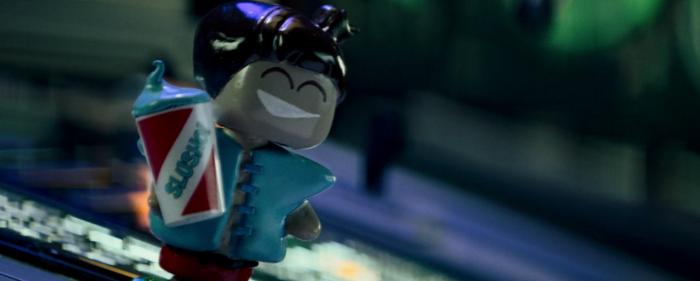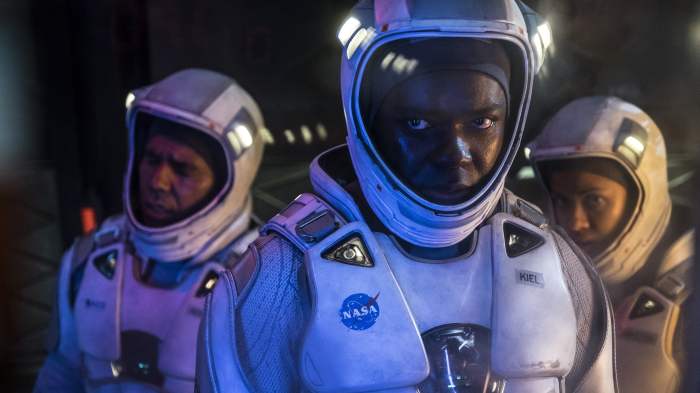Like most of you, I was watching the Patriots lose in the Super Bowl (!) last weekend and saw an ad for the long-rumored, oft-secretive third film in the Cloverfield franchise, the next in a somewhat intriguing series of movies with potential callouts to found-footage, science fiction, and suspense thriller lovers alike. While the first ad simply showed a trailer for the movie, essentially portraying it as a Black Mirror meets Alien type of romp and claiming that it would “explain why,” the second ad was perhaps the more buzzworthy of the two, as it announced the release of the movie on Netflix directly following the big game.
Wait, what?
While this isn’t necessarily a critique or kudos to the movie itself, the method of release of The Cloverfield Paradox definitely deserves mentioning here as a truly revolutionary technique in film distribution and marketing. While the second film in the Cloverfield universe (the truly awesome 10 Cloverfield Lane – I’d recommend it if you haven’t yet seen it, though you can also watch The Cloverfield Paradox first with really no spoilers at all if you like) pulled a similarly sneaky trick, releasing the first and only trailer for the movie – again on Super Bowl Sunday, back in 2016 – just a few weeks ahead of its release, this new method is very next-level stuff, and is in many ways completely genius. With a large amount of marketing dollars likely saved (even considering the exorbitant average cost of a Super Bowl ad), Abrams and Co. are demonstrating solid business acumen here, while essentially dropping a bomb on Cloverfield fans and members of the Netflix general public, all the while asking the question: how can this frenzy be topped when Cloverfield 4 drops? I certainly doubt that JJ Abrams will actually be chucking the Blu-Ray directly through anyone’s window, but what’s for sure is that their plan for The Cloverfield Paradox worked on me, and I started watching immediately after the game.

The Cloverfield Paradox follows an international team of scientists and engineers trying to solve the world’s energy crisis via particle acceleration.
A couple of firsts for this week’s review: namely, this will be the first review I’ve done of a movie with a Rotten score on Rotten Tomatoes (undeniably Rotten in the case of The Cloverfield Paradox, which sits currently at a 16% critics’ consensus). This will also be the first review I’ve done of a movie released straight to streaming (Netflix, in this case – reportedly, America’s favorite on-demand platform paid Paramount north of $50 million for this next Abrams-produced installment in the Cloverfield series). Warning: some spoilers follow, largely concerning my continued discussion of the Cloverfield universe as a whole and where Paradox leaves us in terms of both the past and the future.

Ahh, the memories. 2008 was a simpler time.
Which brings me to my first point, and far and away my biggest gripe with The Cloverfield Paradox: its purported claim that it will answer questions about the other films in the Cloverfield universe is for the most part false. While the inter-dimensional travel featured in the movie is very briefly alluded to as the source of the Godzilla lookalike that causes havoc in Cloverfield, and perhaps even the source of the mysterious alien invaders shown in 10 Cloverfield Lane, this is a major plot point in terms of building Cloverfield’s world (doubtless what Paramount and Abrams want to do) that’s pretty much glossed over in a 10-second clip, not mentioned or alluded to at all again until the closing shots revealing the big bad monster fans know and love. Given that this project clearly started as a standalone film aiming to be an Arrival type of journey (asking some mind-bending questions, but providing little to none of the visual flair of a director like Denis Villeneuve), and was then essentially retrofitted with a couple of Cloverfield references to tie it into the universe, what The Cloverfield Paradox does in terms of adding to that existing mythos is exactly nothing.

For those like me who want to know what Slusho’s involvement in all of this is, you shouldn’t plan on learning anything here.
This is frustrating to me, because what the super-cool vision for the Cloverfield universe seems to be is for it to act as a franchise-esque umbrella under which independent screenwriters can keep their creations dry – that is, individuals can write a gripping story, and with the proper care, fold it into what’s basically becoming an anthology. 10 Cloverfield Lane had a production path similar to The Cloverfield Paradox, and so it’s a little hard to say how that one went so right where this one went wrong, but I’d point to the extremely limited scope of 10 Cloverfield Lane as a huge factor making it a strong candidate for the ol’ Cloverfield fold-in. Regardless of the true answer to that question, what’s clear is that The Cloverfield Paradox misses the target that 10 Cloverfield Lane was very much able to hit within the same framework, and would probably have been better off remaining with its original no-strings-attached title (The God Particle).

Just Daniel Bruhl and Ziyi Zhang pretending to do physics.
But I also want to note that it’s not all bad. There are, in fact, parts of The Cloverfield Paradox that are fairly compelling, which is not what the reviews out there would have you believe. Stripping away my Cloverfield-specific issues, I’d venture so far as to say that I’d see it as a decent sci-fi thriller, perhaps not as tightly written as some other recent hits in that genre (the aforementioned Arrival, Gravity, Interstellar, The Martian, to name a few), but at times enjoyable nonetheless. While Paradox does feature a completely needless and logically fuzzy Earth-bound subplot, the main plot that centers around the crew in deep space stands solidly enough on its own, and is well-acted by a talented and diverse cast featuring relative unknown Gugu Mbatha-Raw, David Oyelowo, and Chris O’Dowd, among others. It’s far from devoid of space survival cliches, but it’s smartly fast-paced to try to compensate, and it does feature some solid twists tucked into a tale that’s admittedly slightly predictable.

The cast after seeing the reviews hit Rotten Tomatoes.
One thing that The Cloverfield Paradox does well and does early is that it identifies itself primarily as a stepping stone to more Cloverfield movies, in the hopes of creating something adequately broad-reaching, but unique compared to more traditionally successful comic-fueled universes. What Cloverfield‘s decisionmakers need to do from here is make sure that its future installments (should they happen) are more carefully and concretely tied into the existing world the franchise is creating. This is not to say that the ties need to be major (i.e. characters appearing in multiple films), but they need to feel more purposeful than The Cloverfield Paradox‘s do. This is why – as I mentioned in my Justice League review – the MCU is as successful as it is: it’s all clearly calculated.
In short, The Cloverfield Paradox isn’t at all what it’s cracked up to be, but it serves as a reasonable diversion in my opinion, and best of all, it’s free to Netflix subscribers and/or Netflix piggybackers. If you’re a fan of particle accelerators, giant space stations suddenly disappearing, and/or interstellar espionage, it might be for you, but in reality, it’s not quite as exciting as those keywords may suggest.
[…] viewers, but its originality alone warrants a watch in my opinion. Much like my previous review (The Cloverfield Paradox), I feel that it’s far better than its Rotten Tomatoes score (a respectable but unexciting […]
LikeLike
[…] announcement that the film would be ready to stream that night (and, incidentally, turned out to be not that great). We can just throw this meager allotment of cinematic teasers on the pile of reasons that Super […]
LikeLike